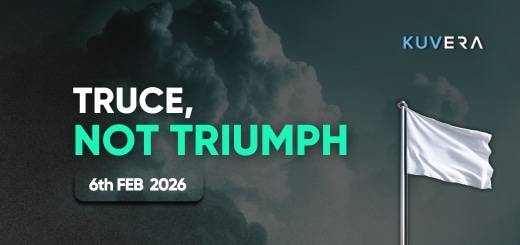In this edition, we talk about the great Indian bank loan write-off and what the minutes of the latest US Fed meeting indicate. We also talk about Essar Group’s milestone and Tata Group’s plan to expand its bottled water business.
Welcome to Kuvera’s weekly digest on the most critical developments related to business, finance and markets.
tl;dr Hear the article in brief instead?

“If you owe your bank a hundred pounds, you have a problem. But if you owe a million, it has,” so said John Maynard Keynes, the early 20th-century British economist and the father of modern macroeconomics. Nothing, perhaps, is more apt than this piece of Keynesian wisdom when we look at the state of Indian banking sector.
India’s banks—mostly state-owned lenders, but many private-sector ones, too—have been hobbled by a massive pile of bad loans for a better part of the past decade. Most of this problem was caused because many corporate houses—think of Anil Ambani’s Reliance Group, Vijay Mallya’s Kingfisher, Mehul Choksi’s Geetanjali Gems—didn’t repay the money they had borrowed.
But aren’t banks getting things under control now? Yes, they seem to be.
For the year ended March 2022, banks’ non-performing assets—a respectable term for loans that are not repaid—fell to 5.9% of total advances from 11.5% in March 2018.
So, the banks must have gone after the corporate defaulters and recovered their money, right? Well, not really. They recovered only 13%, per The Indian Express.
Then, how did the banks bring down the NPAs? They just wrote off the bad loans.
They did what? A write-off means a lender removes a bad loan from its asset book because it no longer hopes to get the money back and shows it as a loss—and even claims a tax benefit!
In all, Indian banks wrote off bad loans of more than Rs 10 trillion in the last five years. That’s $125-150 billion at the prevailing exchange rates. These massive write-offs indicate that the real problems haven’t really been addressed but have been side-stepped to clean up the books.
Why does it matter to us? To keep things simple, let’s just say this—if everyone repaid their loans, banks would have greater room to increase interest rates on deposits and make loans cheaper. So, the fixed-deposit that fetches you 5-6% could have earned 7-8%. And that home loan where you are paying 8-10%, could have cost you 6-7%.
The numbers are hypothetical, of course, but the lesson here is that if everyone is pulling their weight, everyone will have to carry a little less burden. But until that happens, let’s remember what the British weekly newspaper The Economist wrote a few years ago: “If you owe your bank a billion pounds everybody has a problem.”
Essar hits a milestone
Talking about debt-laden companies, one conglomerate has come out with flying colours. Essar Group said this week it has become debt-free after settling the rest of its Rs 2 trillion ($25 billion) borrowings.

Essar Group was founded by brothers Shashi and Ravi Ruia five decades ago. It emerged as one of India’s biggest corporate houses in the first decade of the 21st century, with presence in a wide range of sectors such as telecom, BPO, power and infrastructure, ports and shipping, oil refining, and steel. Most of this expansion, however, was fuelled by debt. Changing commodity cycles made matters worse, hurting Essar Steel and Essar Oil in particular.
The group exited telecom more than a decade ago by selling its stake to Vodafone, but its debt problems worsened only after. In late 2016, it sold its oil business including the flagship Vadinar refinery in Gujarat to a consortium led by Russia’s Rosneft for almost $13 billion. The following year, it divested its BPO business Aegis. In August 2017, Essar Steel was pushed into insolvency as lenders sought to recover more than Rs 54,000 crore. After a long-drawn bankruptcy battle, Lakshmi Mittal-led ArcelorMittal and Japan’s Nippon Steel acquired Essar Steel three years ago.
Essar has now sold a 270-MW power plant, a 25 million tonne per annum port at Hazira, Gujarat, and a 12 MTPA port at Paradip, Odisha to ArcelorMittal Nippon Steel Ltd for $2.05 billion.
If only other corporate houses had followed Essar’s example!
Back to lending
With bad loans seemingly under control, banks are now once again increasing lending to local companies. Overall loan growth in the last two weeks of October was up nearly 17% from a year earlier, according to RBI data. Lending to companies increased 12.6% in September. That’s the fastest pace of growth since 2014, per Reuters.
Growth in corporate lending indicates that India is on the cusp of a new private investment cycle after years of constraints due to high bad loans at banks, elevated debt levels of companies and weak demand.
A stock market boom and low interest rates over the past couple of years helped companies to raise equity capital and cut borrowing costs. However, the pick-up in corporate lending comes at a time when the economic recovery from the Covid-19 pandemic has begun to lose steam and the world’s most advanced nations are staring at a recession. While India itself won’t enter a recession, weakening export demand will drag economic growth down.
Goldman Sachs, the marquee US investment bank, joined several other institutions this week to predict that India’s GDP growth will slow down. It expects growth to fall to 5.9% next year, from an estimated 6.9% in 2022.
The Fed’s pace
The growth rate will fall also because of rising interest rates, both in advanced economies as well as at home, to control inflation. The pace of rate hikes, however, is likely to slow down.
The US Federal Reserve is widely expected to raise interest rate by 0.50% at its policy meeting next month, after four consecutive hikes of 0.75% each to take the main funds rate to its highest level since the end of 2007.
According to the minutes of the Fed’s meeting earlier this month released this week, a “substantial majority” of participants judged that a slowing in the pace of increase would likely soon be appropriate. But opinion is still divided on how high the Fed ultimately raises interest rates.
At home, the Reserve Bank of India’s monetary policy committee will also meet early next month to decide on interest rates. Apart from inflation data, the RBI will also consider the GDP data for the July-September quarter, which will be released next week.
Tata’s thirst
Moving on from the broader economic developments, the Tata Group is set to acquire India’s most famous bottled water brand—Bisleri—in a deal that could be worth Rs 6,000-7,000 crore.
Bisleri, originally an Italian brand that entered India in 1965, was taken over by the Chauhan family in 1969. Today, its annual revenue is around Rs 2,500 crore with a profit of over Rs 200 crore.

Ramesh Chauhan, who built the Bisleri brand, told The Economic Times this week that he made up his mind to sell the company to the Tatas after meeting Tata Sons chairman N Chandrasekaran and Tata Consumer Products CEO Sunil D’Souza a few months ago. The planned sale comes three decades after Chauhan sold Thumbs Up, Limca, Maaza and Gold Spot to Coca-Cola.
Tatas, on their part, haven’t yet announced the deal, saying only that they remain in discussions. If the deal does go through, Tatas would get to own a brand that was being courted by rivals such as Reliance Retail, Nestle and Danone. Tata Consumer is aggressively expanding in the FMCG, and Bisleri will complement its packaged mineral water brand Himalayan as well as Tata Copper Plus Water and Tata Gluco+.
Market wrap
Both the benchmark Sensex and Nifty touched new record highs on Friday. While the 30-stock Sensex hit 62,447.73, the 50-stock Nifty crossed 18,500. For the week, the two indices rose about 1.0% each.
The markets rose on expectations that interest rate hikes will slow down in coming and as foreign investors continued to pour money. Net investments into Indian equities by foreign portfolio investors have crossed $3.3 billion so far in November—only the third month in 2022 when FPIs have been net buyers.
The Nifty stocks that gained the most this week were HDFC Life Insurance, Apollo Hospitals, BPCL, IndusInd Bank and Axis Bank. The laggards included Adani Enterprises, Nestle, Kotak Mahindra Bank and Adani Ports.
In the broader market, Easy Trip Planners soared 36% while state-run Punjab National Bank jumped almost 17%. Policybazaar parent PB Fintech was another significant gainer, rising around 14%. The biggest loser in the Nifty 500 pack was Paytm, which lost 15% on reports of the entry of Reliance Jio in the financial services sector.
Other headlines:
- FIFA World Cup kicks off with some shock results in the first week as Germany and Argentina lose to Japan
and Saudi Arabia, respectively.
- Adani Enterprises to raise Rs 20,000 crore via follow-on public offering
- Google plans to cut 10,000 jobs; Hewlett-Packard to lay off 6,000 employees
-
Finance Minister Nirmala Sitharaman starts pre-Budget consultations
-
Uniparts India’s IPO to kick off on November 30
- Rustomjee Group company Keystone Realtors lists at 2% premium to IPO price
- Inox Green Energy Services ends 9% lower on market debut
- Five Star Business Finance lists at 5% discount to issue price, closes with 3% gain
- Archean Chemical lists at 10% premium to issue price
- Yatra Online gets SEBI approval to float IPO
-
Motilal Oswal AMC starts accepting subscriptions in three international funds
The week ahead
- The government will release the GDP data for July-September on Nov. 30.
- All eyes will remain glued to TV sets for the FIFA
Until next week, happy investing!
———–
Interested in how we think about the markets?
Read more: Zen And The Art Of Investing
Check out our “Kuvera Insights” on Youtube and learn from the industry experts.
Watch here: Investing in international markets
Start investing through a platform that brings goal planning and investing to your fingertips. Visit kuvera.in to discover Direct Plans and Fixed Deposits and start investing today.
#MutualFundSahiHai #KuveraSabseSahiHai










